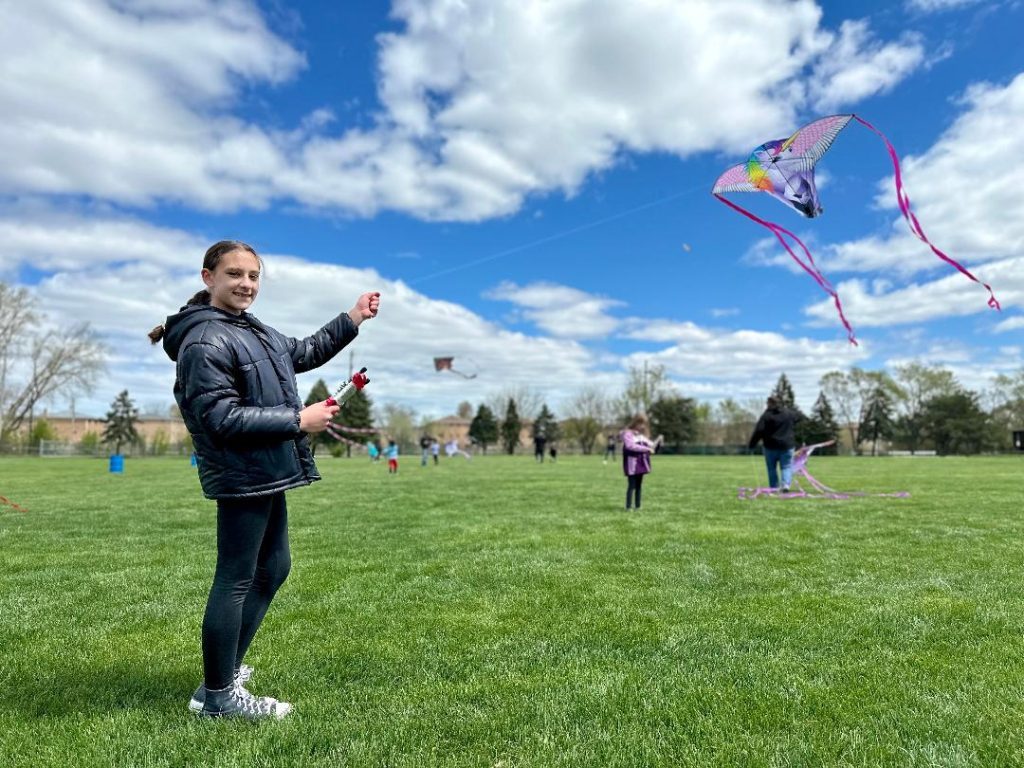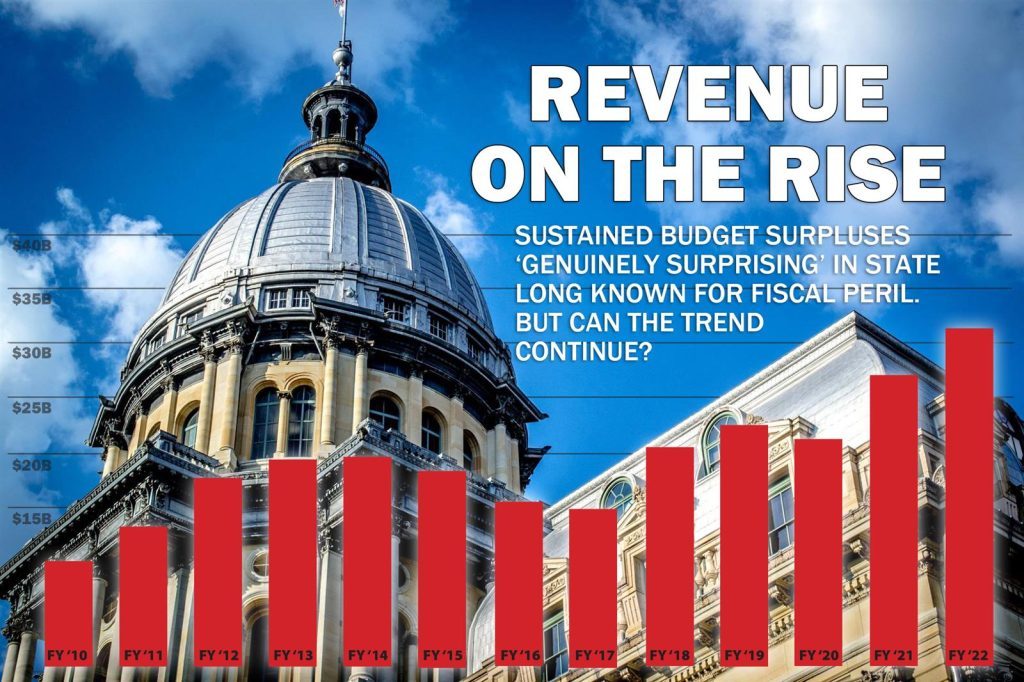
Amid ‘unprecedented’ prolonged revenue boom, state finds budget breathing room
By JERRY NOWICKI
Capitol News Illinois
jnowicki@capitolnewsillinois.com
SPRINGFIELD – Sustained higher-than-predicted state tax revenues have in recent months given lawmakers a level of budgeting flexibility that is, at least in modern times, without precedent in a state with a reputation for perilous finances.
For the current fiscal year and the one before it, that’s led to another uncommon Capitol occurrence: budget surpluses in the billions of dollars.
Over those two budget years, lawmakers have increased pension contributions by $500 million beyond required levels, paid off hundreds of millions of dollars in interest-accruing debt and saved nearly $2 billion in a budget stabilization fund – all while increasing education and human services funding and even providing tax relief for most Illinoisans last year.
“Balancing the budget in Illinois is a relatively new thing, you know, over the last four years, and so we’re proud of the fact that we’ve focused on that,” Gov. JB Pritzker said in a recent media call.
The current-year expected surplus has been driven by the state’s “big three” revenue sources – sales tax and personal and corporate income taxes – which have continued to outperform even their robust growth from the year prior even without increases to the base tax rates.
The governor attributed the strong revenue performance at least partially to conservative initial budgeting estimates, changes to corporate tax exemptions and collection of online sales tax. Others have cited such factors as inflation and wage growth, as well as changes in consumer spending amid the COVID-19 pandemic.
Pritzker and Comptroller Susana Mendoza have frequently pointed out that recent budgets have not been balanced by the $8.1 billion in direct federal COVID-19 stimulus funds sent to Illinois through the American Rescue Plan Act. But the comptroller noted in a recent interview with Capitol News Illinois that the economic effects of broader federal stimulus – such as added unemployment benefits and direct checks to Illinoisans – have been a main driver of state revenue growth nationwide.
“The stimulus that went directly into people’s homes was significant in terms of its help, not just in Illinois, but across the country,” Mendoza said. “These numbers could be replicated in any other state, where instead of collapsing the economies, those states saw that their residents who received this direct stimulus did not save it in most instances, but they actually spent it in the marketplace.”
Low unemployment rates continue to boost revenue performance, she said.
‘Genuinely surprising’
Former Rep. Tom Demmer, the House Republicans’ longtime budgeting point man and the party’s unsuccessful candidate for state treasurer last year, said the revenue trends are something he hadn’t seen in his decade in Springfield.
“It is genuinely surprising to see not just a slight revision upward, but really multiple consistent revisions upward in what we think we’re going to collect this fiscal year,” Demmer told CNI. “That’s really unprecedented.”
For the fiscal year that ended in June, revenues soared past the state’s initial $42.3 billion approved budget by nearly $8 billion when excluding ARPA fund transfers.
In the recently concluded lame duck session, Democrats passed a surplus spending plan that allocated an additional $3.6 billion in unexpected revenues beyond the initial $46.5 billion budget approved last spring. That included nearly $2.7 billion in debt repayment and long-term savings and about $925 million in new, one-time spending.
“I mean, it is weird because we’re not used to seeing this, right?” Mendoza said. “And when I say that, it’s sarcastically because this is a very good thing. If (lawmakers are) going to have new spending, it should be for responsible fiscal measures, and this is a perfect example of that.”
Mendoza specifically referenced a $1.8 billion cash infusion into the state’s Unemployment Insurance Trust Fund that was included in the plan.
Her office last week sent about $1.4 billion of that to the federal government to repay the last of a $4.5 billion debt taken on to keep the state’s unemployment system afloat amid the pandemic.
The debt had already cost the state $60 million in interest. Repaying it saves about $20 million in interest and prevents greater increases to employer tax rates and a disruption of benefits for individuals claiming unemployment.
The recent spending plan also included an $850 million allocation to the “rainy day” fund, which will bring it to its highest-ever balance of $1.9 billion – a far cry from its $60,000 balance when the pandemic hit.
It’s the type of budgeting practice that even some Republicans can support, even if they remain reticent to vote for what they view as spending increases that could prove problematic when recent revenue trends subside.
“I do give credit to the administration for their prioritizing paying down any of the debt that we incurred,” Demmer said. “On the other hand, I’m still concerned about some of the spending growth relative to what we expect our economic and revenue growth is going to look like.”
Demmer referenced the Governor’s Office of Management and Budget’s five-year state budget projection. The November report noted after an expected surplus this year and next, Illinois could be in for a deficit of about $384 million in Fiscal Year 2025 and beyond.
“Unlike some years in the past where we could point to one thing – sometimes it was just pensions or Medicaid growing too fast – I think that by contrast, now there’s spending growth across the board on existing programs,” Demmer said. “And then add on to that any new legislative initiatives that come on, that’s where it gets to be real concern.”
Demmer said he was concerned by the prospect of two new major spending areas floated by Pritzker in his inaugural address earlier this month: an expansion of access to free child care, preschool and college education for Illinoisans.
New one-time expenditures
Mendoza said there will always be pressure on legislators to deliver new programs and spending, but for the most part recent spending plans have focused excess revenues on one-time expenditures with a heavy emphasis on debt repayment.
“What I would be opposed to is seeing new funding items – unless you can really sell that this is an extreme necessity for the state at this time – we want to stay away from funding new programs that are going to have to be funded year to year,” she said.
In the recent supplemental plan, contained in House Bill 969 and Senate Bill 1720, lawmakers authorized about $925 million worth of spending beyond the debt and savings measures.
That included $400 million to create a business attraction or “closing” fund under Pritzker’s authority that the administration hopes will help lure new or existing businesses to expand in Illinois. That was part of a broader expansion of several economic incentives.
Other appropriations included $196 million in temporary payments to hospitals and community mental health providers through the state’s Medicaid program, $110 million for the Department of Human Services to support asylum seekers, and $100 million to the Department of Innovation and Technology to pay interest-accruing bills.
The plan also included added funding for DHS-run mental health centers and for the courts to cover costs associated with the SAFE-T Act criminal justice reform among other expenditures.
During the lame duck session, Republicans criticized the inclusion of a list of more than 100 violence prevention grants totaling $45 million that were concentrated in Democratic districts. Demmer cited such perceived partisan spending as another reason many recent spending plans passed without Republican support.
Lessons from the past
Along with Demmer on the Republican side, two of the House Democrats’ budgeting leaders recently retired from the General Assembly – Reps. Greg Harris, of Chicago, and Mike Zalewski, of Riverside.
“I came in during this toxic cloud of three things happening,” Zalewski told CNI. “One, the Great Recession. Two, I would say, a spending base that didn’t meet the existing revenues. And three, this political upheaval of Gov. (Rod) Blagojevich getting arrested and then Gov. Pat Quinn coming in.”
The end of Quinn’s term coincided with the expiration of a temporary four-year income tax hike, sending state revenues plummeting by billions of dollars in the first year of Republican Gov. Bruce Rauner’s term. That suddenly exacerbated structural deficit laid the groundwork for a crippling two-year budget impasse between Rauner and Democrats in the General Assembly, eventually leaving Illinois with a nearly $17 billion backlog of unpaid bills.
The impasse finally ended when lawmakers – including a group of Republicans – overrode Rauner’s veto on a spending plan that included a tax increase nearly to the level of the 2011 temporary tax hike.
Two years later, Pritzker defeated Rauner in a landslide, bringing what Zalewski called a more “pragmatic” approach to state budgeting that’s been made easier by revenue growth.
Both Harris and Pritzker noted that, in recent years, lessons from the past have led lawmakers and the administration to take a conservative approach to revenue estimates.
“We don’t ever want to get into a situation where you get near the end of the year, and then it turns out revenue isn’t meeting your expenditure needs,” Pritzker said. “And so we’ve been conservative about it and as a result, you know, we’ve balanced budgets and run surpluses.”
In the current fiscal year’s budgeting process last April, for example, lawmakers planned for an 8 percent decrease from their final base revenue levels from the previous year. As those revenues continue to perform well, lawmakers have considered the supplemental spending plans.
Harris, meanwhile, pointed to a recent report from the legislative Commission on Government Forecasting and Accountability which noted a slight decline in base revenues in December could be an indicator that the economy is beginning to slow.
“You’re beginning to see a downturn in numbers,” he said. “And it’s too early to tell yet if this is a one-time thing, or if this is the beginning of a weaker economic period that people have been saying could be coming. So we’ll see what the future holds.”
But Zalewski and others maintain Illinois is likely better equipped to handle the unforeseen after its recent budgeting actions and because the state’s required pension payment – which generally exceeds 20 percent of general revenue fund spending – is leveling.
“I think we’re way better prepared than we would have been eight years ago,” Zalewski said. “We have a rainy day fund. And I think we have a leadership structure in place that understands that adding spending during those times is not a good idea. So I’m overall sort of cautiously optimistic we can weather whatever’s coming our way.”
Pritzker will propose his spending plan for the upcoming fiscal year to lawmakers on Wednesday, Feb. 15, during his annual State of the State address.
Capitol News Illinois is a nonprofit, nonpartisan news service covering state government. It is distributed to more than 400 newspapers statewide, as well as hundreds of radio and TV stations. It is funded primarily by the Illinois Press Foundation and the Robert R. McCormick Foundation.
Local News
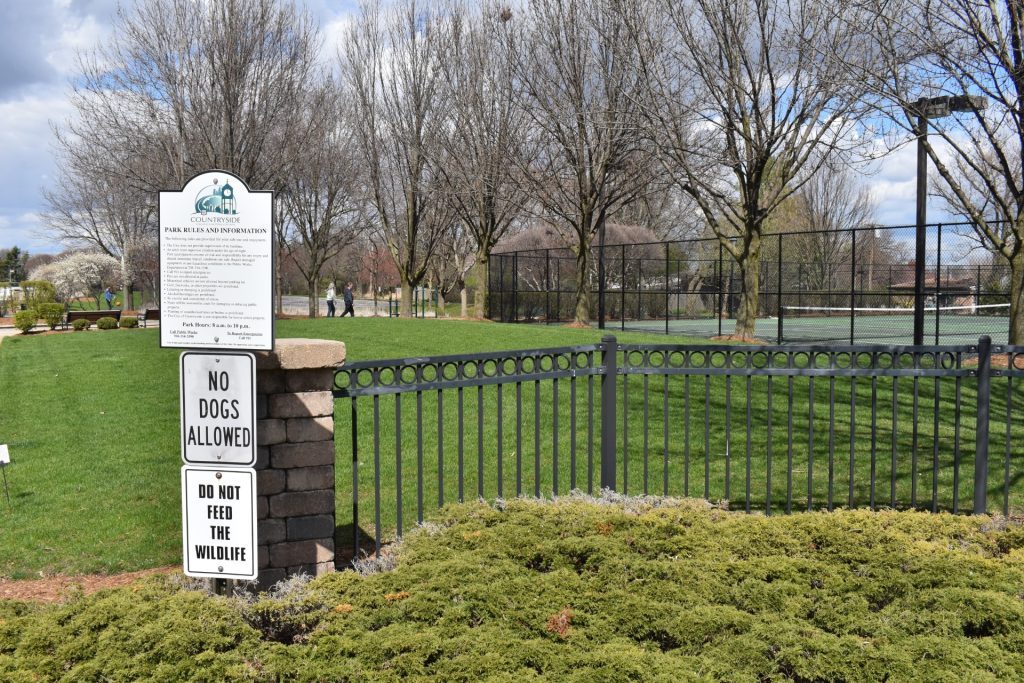
Countryside puts dog park on hold, will require leashes in two parks
Spread the loveBy Steve Metsch The city of Countryside has put on hold building a dog park, but canines and their owners are still in store for a treat. The city council has unanimously approved a plan to permit dogs in City Park and Countryside Park this year. Previously, they were not allowed in the…

Bridgeview approves auto repair shop
Spread the loveMoves up time for May 1 village board meeting By Steve Metsch Bridgeview is getting a new automotive repair shop. The village board at its April 17 matinee meeting approved a special use permit that will allow a repair shop at 9010 S. Beloit Ave. There was no discussion among trustees. The board…
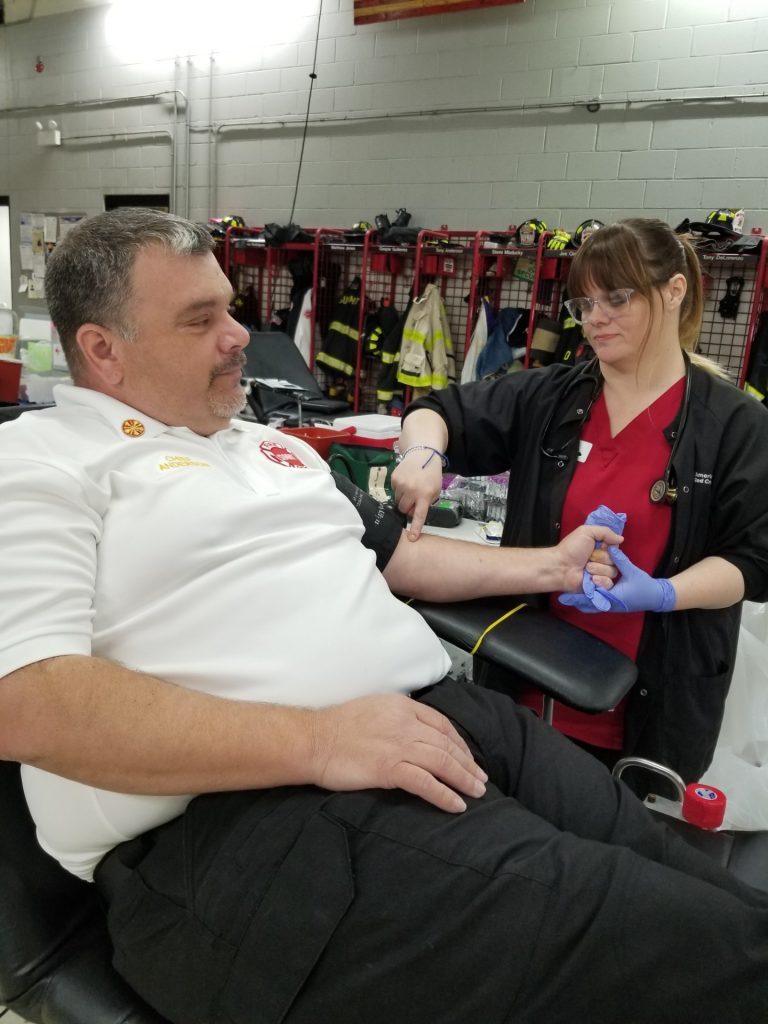
Summit Fire Department blood drive draws a crowd
Spread the loveBy Carol McGowan The Summit Fire Department, along with the Village of Summit, and the Argo Summit Lions Club held a blood drive this past Saturday, and it drew a crowd that even impressed the American Red Cross. It took place from 9 a.m. until 2 p.m. with non-stop donors walking through the…

Hodgkins toasts village businesses
Spread the loveBy Carol McGowan Hodgkins Mayor Ernest Millsap and the Board of Trustees celebrated the village’s businesses at its annual Business Appreciation Breakfast on April 10. Over 100 people gathered at the Hodgkins Administration Center for a hearty breakfast hosted by the village. Representatives from many businesses that are located in or that work…
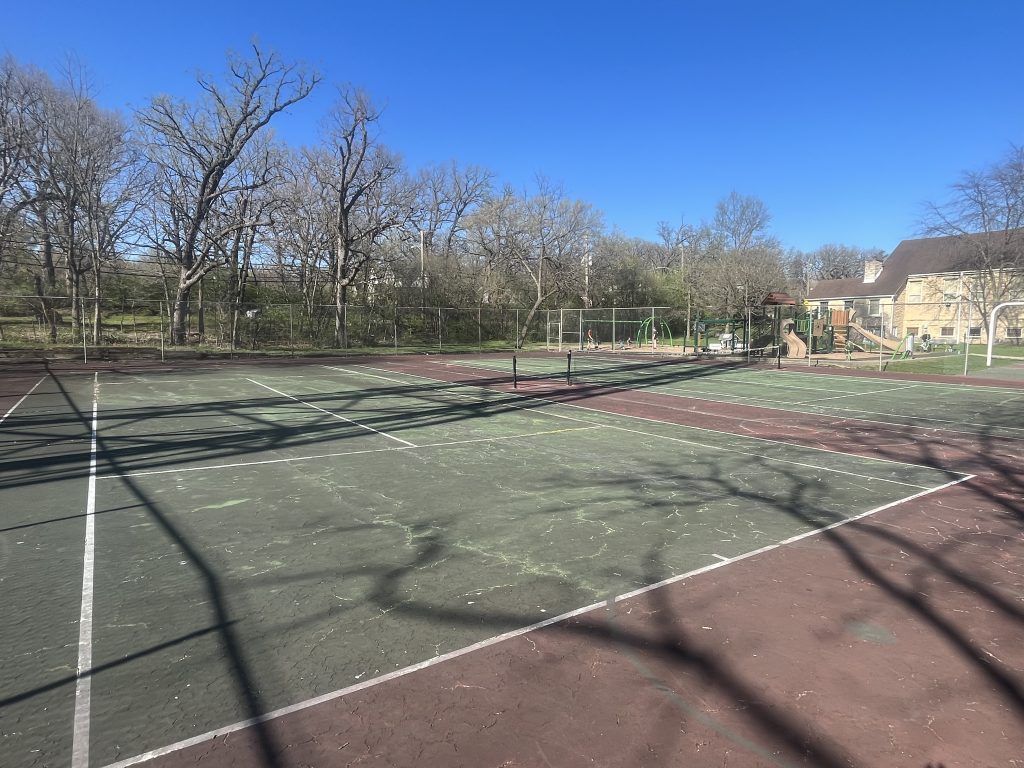
Pickleball courts coming to Palos Park
Spread the loveBy Jeff Vorva There will finally be outdoor pickleball in Palos Park. In a process that went longer than anticipated, the Palos Park Village Council was able give the green light to get a pickleball project started on the Village Green. The council voted April 8 to award the contract to U.S. Tennis…

First Secure Bank to host American Eagle gold coin sale
Spread the loveFrom staff reports First Secure Bank & Trust of Palos Hills announced its annual May sale of 1-ounce and ¼-ounce American Eagle Gold Coins, produced by the U.S. Mint, will take place from 10 a.m.to noon on Saturdays, May 4, May 11, May 18 and May 25. The sale will take place at…

Donate teddy bears to our local police
Spread the love. Peggy Zabicki Your correspondent in West Lawn 3633 W. 60th Place • (773) 504-9327 . Have you ever seen the 1955 movie The Night of the Hunter? The children in this movie show such bravery and acceptance in what life has thrown at them. They have to deal with unimaginable events and sadness. …

Boy Scouts collecting tattered flags for disposal
Spread the love. By Mary Stanek Your correspondent in Archer Heights and West Elsdon 3808 W. 57th Place • (773) 517-7796 . Goodbye April, hello May. Our American Flag, the symbol of our country, should always be treated with respect. But after bearing Chicago’s brutal winters and hot blazing summers along with being in the…

Oak Lawn trustee says village needs state grocery tax
Spread the loveBy Joe Boyle An Oak Lawn trustee said that Gov. J.B. Pritzker’s proposal to eliminate the state’s grocery tax will be costly for the village. Trustee William “Bud” Stalker (5th), accompanied by Mayor Terry Vorderer, recently returned from a fact-finding trip to Springfield where they learned more about the governor’s proposal to eliminate…
Neighbors
Sorry, we couldn't find any posts. Please try a different search.






